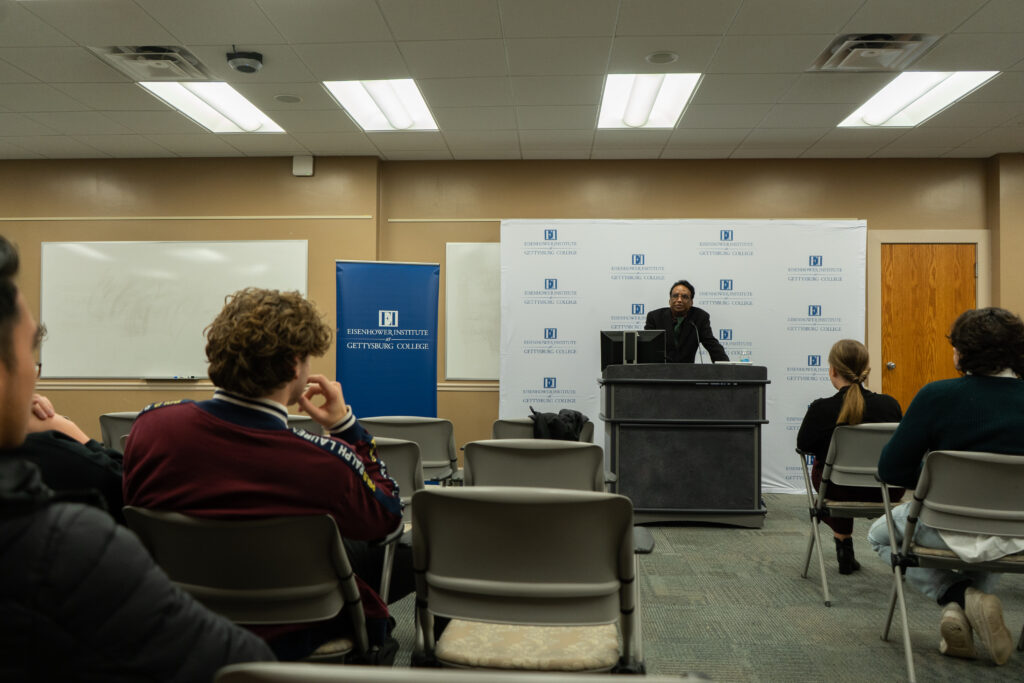By Vincent DiFonzo, Staff Writer

Dr. Ram Mahalingam talks at the Precarity, Dignity, and Well-Being Lecture hosted by the Eisenhower Institute on Thursday, Nov. 3, 2022 (Photo Will Oehler/The Gettysburgian)
On Nov. 3, the Eisenhower Institute Undergraduate Fellows hosted Dr. Ram Mahalingam to give his lecture entitled “Precarity, Dignity, and Well-Being.” Mahalingam addressed problems facing the modern working-class and their mental well-being.
The event started with a brief introduction from Undergraduate Fellow Katherine Schmitz ’23, providing background about his career and research.
Mahalingam is a Professor of Psychology at the University of Michigan, the director of the Barger Leadership Institute, and a published author. Before pursuing his doctorate, he worked many different jobs, which influenced his research on the role of the worker. He has worked as a janitor, a dishwasher, a cook, and a book stacker, among others. Later, he earned his Ph.D. in Developmental Psychology from the University of Pittsburgh.
Mahalingam opened his talk by thanking the audience for their attendance. Then, he told a story about a postal worker from his childhood town in India who was present throughout Mahalingam’s entire childhood.
“He was at our family functions, and we were at his family functions; we had a personal connection,” explained Mahalingam.
He continued, “Now, we have a gig economy.”
Today, he has no idea who delivers his mail. While delivery is much faster than it was when Mahalingam was a child, the personal connection is lost.
Mahalingam then introduced the concept of “precarity,” which refers to a state of instability or impermanence in regards to employment.
“Precarity is not social class, or job-status, or being marginalized, or being vulnerable,” he explained.
Mahalingam worries about the state of those who are in precarious jobs, stating, “When your job is precarious, you are not part of the community.”
Next, he introduced the concept of intersectional precarity.
“Precarity is a situated, spatially organized, socially imposed, and culturally mediated lived embodied reality, and its contours are shaped by the intersection of race, class, gender, sexuality, caste, religion, and immigrant/refugee status,” stated the powerpoint accompanying Mahalingam’s lecture.
Precarity is also on the rise in the modern workforce, according to Mahalingam. With this rise, which he referred to as the proliferation of precarity, workers will suffer in “invisibility, a lack of recognition, disconnect, the normalization of suffering, dignity injuries, psychological and physical wellbeing, and having a meaning in life.”
Mahalingam then explained the Indian caste system and its effect on Indian janitors as a case study of this phenomenon.
“In India, they will not even make eye contact with you if your job status is low,” he said.
All of these problems lead to problems with human dignity. Mahalingam explained that there are three types of dignity: processual, personal, and intersubjective.
Processual dignity refers to how different people are treated in a given place.
Mahalingam explained that processual dignity refers to “how people are treated, if they are happy at work and it’s a compassionate place, and if they are valued at work.”
Personal dignity is “your self-worth, how you express yourself, and it’s unique to you,” he said.
He said your personal dignity is who you are, and Mahlingam argued that violations of that dignity are detrimental.
Intersubjective dignity is how “we connect to make the visible invisible,” according to the powerpoint he presented.
All of this is important to Mahalingam because dignity directly relates to well-being.
During a study, Mahalingam found that there was a direct relationship between dignity and mental health, family relationships, satisfaction with work, and w0rk absenteeism.
When dignity is not respected, it can lead to many problems. One such example relates to women receiving healthcare.
Mahalingam conducted research on women in hospitals to give birth and found a pattern of insensitivity, gaslighting, infantilization, poor communication, and ignorance of the women by doctors.
“This is another common theme. Doctors say ‘we know better than you,’” he noted.
“Dignity violation happens when people are vulnerable,” stated Mahalingam, making it a common occurrence in places like hospitals.
Mahalingam then moved into presenting solutions for these issues, posing the question, “What can we do?”
First, Mahalingam argues that “fostering a dignity culture” is vital. Recognizing others for their achievements, empowering others, and demonstrating solidarity with others are also great ways to promote dignity.
He also believes in supporting dignity at the individual level. Use of words such as “thank you” and simply showing compassion go a long way to promoting dignity.
Respecting your own dignity is also vital. Perfectionism, according to Mahalingam, can cause a person to lose respect for their own dignity.
“The more perfectionist you are, the more hard on yourself you are, which will affect your performance and your health,” he said.
Mahalingam concluded his talk by acknowledging other psychologists that he worked with in his research and by thanking all attendees of the event. Then, he took questions from the audience.
The question and answer section was moderated by Undergraduate Fellows Alli Dayton ’23 and Anthony Choi ’23.
One student asked Mahalingam what he would say to an employer who desires to promote efficiency over their workers’ well-being.
Mahalingam believes that promoting dignity and efficiency are not mutually exclusive.
“We need to change the mindset,” said Mahalingam.
Another student asked how college students who are soon entering the workforce should respond to this lecture.
Mahalingam acknowledged that precarity has been normalized, but remains hopeful that this change is not permanent.
Mahalingam then addressed the students in the audience, stating, “Your generation has to challenge the precarity and challenge the narrative.”
Mahalingam ended his lecture by providing his email, ramawasi@umich.edu, and encouraging anyone to contact him with further questions. He also provided a link to the website mindfuldignity.com for further reading.
Alli Dayton, who moderated the question and answer section, is also Managing/News Editor of The Gettysburgian. This did not in any way impact the reporting of the article.
